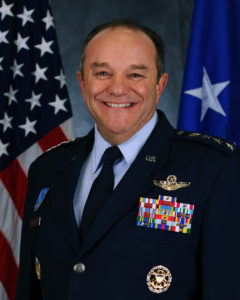NATO military chief: Russia could invade Ukraine 12 hours after order
Daily News Article — Posted on April 4, 2014
 (by Roland Oliphant, Daily Telegraph) MOSCOW – Russian forces are positioned and prepared to launch an invasion of Ukraine within 12 hours of the order being given, NATO’s top general has said [and could take the country within three to five days].
(by Roland Oliphant, Daily Telegraph) MOSCOW – Russian forces are positioned and prepared to launch an invasion of Ukraine within 12 hours of the order being given, NATO’s top general has said [and could take the country within three to five days].
Gen. Philip Breedlove, NATO’s top military official and the man in charge of drafting a response to the Russian annexation of Crimea, said in interviews on Wednesday that Russian forces on the border are poised for a three to five day operation [to take over Ukraine]. [Gen. Breedlove is a four-star general in the U.S. Air Force who currently serves as the Commander, U.S. European Command as well as the 17th Supreme Allied Commander Europe (SACEUR) of NATO Allied Command Operations.]
“It’s my opinion that they could move within 12 hours of a ‘go’,” Gen. Breedlove said in an interview with CNN. “So essentially they could move right away if given the ‘go’.”

U.S. NATO Commander Gen. Philip Breedlove
Gen. Breedlove said 40,000 Russian troops remain in border areas, despite earlier reports that Russia had withdrawn some elements of an earlier troop build-up in recent days.
But he added: “40,000 doesn’t tell the story. This is a combined arms army with all of the pieces necessary should there be a choice to make an incursion into Ukraine,” he said. “All of the logistics required in order to successfully make an incursion if they needed [are present].”
Earlier Gen. Breedlove said an invasion could be launched in the next “three to five days.”
Western intelligence agencies have expressed concern at what they have described as worrying troop buildups on Ukraine’s border in the past week.
 While journalists scouring the border region have failed to find signs of a large troop movements in recent days, security sources have said they believe the troops are camouflaged or located on ministry of defense land closed to the public.
While journalists scouring the border region have failed to find signs of a large troop movements in recent days, security sources have said they believe the troops are camouflaged or located on ministry of defense land closed to the public.
Sergei Lavrov, Russia’s foreign minister, has said Russia has no interest in moving troops across the border.
Gen. Breedlove’s comments come after NATO suspended all military and civilian cooperation with Russia in response to the annexation of Crimea last month.
NATO commanders have also been ordered to devise ways to better protect alliance members that feel threatened by Russia.
At a meeting of alliance foreign ministers in Brussels on Tuesday, Poland asked NATO to station 10,000 troops on its territory.
Viktor Yanukovych, the ousted Ukrainian president, said in an interview on Wednesday that the annexation of Crimea is a “tragedy” for Ukraine and he hoped to persuade Vladimir Putin to reverse the decision.
In an interview with AP and Russia’s NTV television station, Mr. Yanukovych said he had been “wrong” to invite Russian troops onto the peninsula.
Reprinted here for educational purposes only. From a Telegraph news report. May not be reproduced on other websites without permission from the Daily Telegraph.
Questions
1. a) Who is Philip Breedlove?
b) What is NATO? Be specific.
c) How has Gen. Breedlove changed his assessment of the possibility of a Russian invasion into Ukraine?
2. How do NATO sources explain the fact that journalists have failed to find signs of large Russian troop movements?
3. How are the Russians responding to accusations that they appear prepared to invade Ukraine?
4. a) Define annexation.
b) What did NATO do in response to Russia’s annexation of Crimea last month?
5. What have NATO commanders been ordered to do?
6. What request has Poland made of NATO?
Poland has asked NATO to station 10,000 troops on its territory. (para. 12)
Background
ON NATO:
The North Atlantic Treaty Organization (NATO) is an alliance of 28 countries from North America and Europe committed to fulfilling the goals of the North Atlantic Treaty signed on April 4, 1949. In accordance with the Treaty, the fundamental role of NATO is to safeguard the freedom and security of its member countries by political and military means. NATO is playing an increasingly important role in crisis management and peacekeeping.
POLITICAL - NATO promotes democratic values and encourages consultation and cooperation on defence and security issues to build trust and, in the long run, prevent conflict.
MILITARY - NATO is committed to the peaceful resolution of disputes. If diplomatic efforts fail, it has the military capacity needed to undertake crisis-management operations. These are carried out under Article 5 of the Washington Treaty - NATO’s founding treaty - or under a UN mandate, alone or in cooperation with other countries and international organizations. (from nato.int)
NATO member countries (and years joined):
ALBANIA (2009)
BELGIUM (1949)
BULGARIA (2004)
CANADA (1949)
CROATIA (2009)
CZECH REPUBLIC (1999)
DENMARK (1949)
ESTONIA (2004)
FRANCE (1949)
GERMANY (1955)
GREECE (1952)
HUNGARY (1999)
ICELAND (1949)
ITALY (1949)
LATVIA (2004)
LITHUANIA (2004)
LUXEMBOURG (1949)
NETHERLANDS (1949)
NORWAY (1949)
POLAND (1999)
PORTUGAL (1949)
ROMANIA (2004)
SLOVAKIA (2004)
SLOVENIA (2004)
SPAIN (1982)
TURKEY (1952)
THE UNITED KINGDOM (1949)
THE UNITED STATES (1949)
